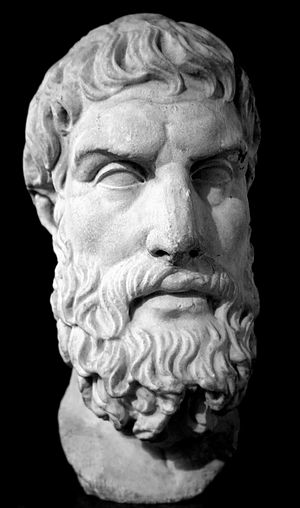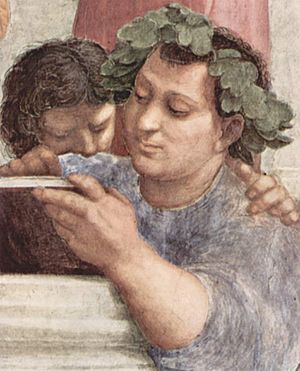Epicurus facts for kids
Quick facts for kids
Epicurus
|
|
|---|---|

Roman marble bust of Epicurus
|
|
| Born | February 341 BC |
| Died | 270 BC |
| Era | Ancient philosophy |
| Region | Western philosophy |
| School | Epicureanism, atomism, materialism, hedonism |
|
Main interests
|
Physics, ethics, epistemology |
|
Notable ideas
|
Pleasure principle, the "moving"/"static" pleasures distinction, ataraxia, aponia, atomic swerve |
|
Influences
|
|
|
Influenced
|
|
Epicurus (born in Samos in 341 BC, died in Athens in 270 BC) was an important ancient Greek philosopher. He started a way of thinking called Epicureanism. This philosophy taught that finding pleasure and avoiding pain were the best goals in life. Epicureanism was very popular in ancient Greece and Rome for a long time.
Contents
Who Was Epicurus?
Epicurus was born in February 341 BC on the Greek island of Samos. His parents were from Athens. His father, Neocles, worked as a schoolteacher.
Epicurus began studying philosophy when he was 14 years old. He learned from a teacher named Pamphilus. He was also influenced by other thinkers like Democritus and Pyrrho. When he was 18, he went to Athens for his military service.
Epicurus's School of Thought
Epicurus first opened philosophy schools in Mytilene and Lampsacus. Later, around 306 BCE, he moved to Athens. There, he founded a special community and school called The Garden. People who lived in The Garden practiced Epicurus's ideas.
The Garden was unique because it was the first ancient Greek philosophy school to regularly welcome women. This was a big step for its time.
Key Ideas of Epicurus
Epicurus believed that the gods did not get involved in human lives. He also taught that death was not something to fear. He thought that when we die, our consciousness simply ends.
He also believed that the universe was endless and eternal. He said that everything in the world was made up of tiny particles called atoms.
Epicurus taught that the secret to a happy life was to live calmly. He said it was important to avoid having too much of anything. He thought that chasing after money, power, or fame would not make people truly happy. Instead, he believed real happiness came from simple joys. These included good friendships, tasty food, and learning new things.
How Epicurus Differed from Other Philosophers
Epicurus's ideas were different from many other philosophers of his time.
- Unlike the Stoics: Stoics believed in living with nature and accepting what happens. Epicurus, however, thought that seeking pleasure and avoiding pain was the way to happiness.
- Unlike the Cynics: Cynics believed in living a very simple life without many things. Epicurus agreed that simple pleasures were important. But he also thought pleasure should be enjoyed in a balanced way. He valued friendship and learning as key parts of a happy life.
- Unlike the Platonists and Aristotelians: These groups believed in a true, unchanging reality. Epicurus believed that everything was made of atoms. He thought the universe was infinite and would last forever.
Epicurus on Ethics and Happiness
Epicurus based his ideas about right and wrong on pleasure. He saw pleasure as the main good thing in life. He believed that the main goal for humans was to be happy. He thought happiness came from seeking pleasure and avoiding pain.
He taught that pleasure should be sought in a balanced way. Too much pleasure-seeking could actually lead to pain. He also believed that true happiness came from friendship. He thought that peace of mind could be found through studying philosophy.
Epicurus focused on what made individuals happy. He did not put as much importance on things like justice for society.
Epicurus's Writings
Epicurus wrote many books, about 37 volumes in total. Sadly, most of his writings are lost today. Only small parts and four letters still exist.
Some of his surviving works include "Letter to Menoeceus" and "Principal Doctrines." Another important work is "Vatican Sayings," found in a manuscript in the Vatican Library in 1888. These writings share his ideas on pleasure, avoiding pain, the universe, and the gods.
Epicurus's Personal Life
Epicurus never got married and did not have children. He believed that friendship was one of the most important things for a happy life. He thought true friends should share everything. He felt that being happily unmarried was better than being unhappily married. He believed that marriage was not needed for happiness.
Death of Epicurus
Epicurus passed away at the age of 71. He died from a long-term problem with his urinary tract. Even though he was in pain, he remained calm. He followed his own teachings about handling pain and sickness.
Epicurus's Lasting Impact

Epicurus's ideas were often debated. Some people admired him as a bold thinker. He challenged old beliefs about gods, death, and pleasure. Others thought he was dangerous. They believed he encouraged people to seek too much pleasure and ignore traditional values.
Despite these debates, Epicurus's philosophy had a big impact on Western thought. His ideas are still studied and discussed by philosophers today.
Images for kids
-
The idea of the "problem of evil" is often linked to Epicurus by David Hume (pictured).
-
Dante Alighieri meets Epicurus in his Inferno. This illustration is by Gustave Doré.
-
The French philosopher Pierre Gassendi helped bring Epicureanism back into focus in modern times.
-
A bust of Epicurus with his student Metrodorus at the Louvre Museum.
See also
 In Spanish: Epicuro para niños
In Spanish: Epicuro para niños
 | Calvin Brent |
 | Walter T. Bailey |
 | Martha Cassell Thompson |
 | Alberta Jeannette Cassell |









